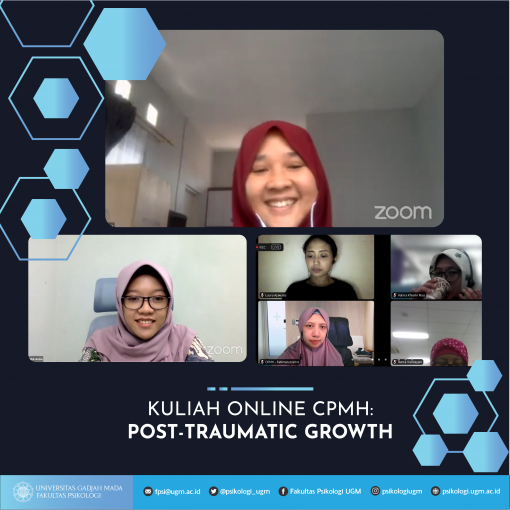
The Center for Public Mental Health (CPMH) of the Faculty of Psychology again held an Online Lecture on Friday (4/6). The topic raised in this online lecture was about Post-traumatic Growth, which was discussed by Nurul Kusuma Hidayati, M.Psi., Psychologist and Wirdatul Anisa, M.Psi., Psychologist. The event started with a brief explanation from the moderator who explained what trauma is, “In the medical world, trauma refers to injuries that occur to a person’s body due to collisions, blows, and so on which can be seen from the bruises or blueness that appears”, explained the moderator. Trauma in terms of psychology and medical is actually not much different, both have causes and symptoms that are felt.
The next interesting thing is when people who experience trauma manage to survive and even become better people than before experiencing the trauma incident. This condition is related to post-traumatic growth (PTG), “actually PTG is an old term, but it may not be familiar or less popular among the public”, said Nurul.
Post-traumatic growth is a positive change or transformation experienced by a person after struggling with trauma. Characterized by a quality of self or condition that is more distant than before experiencing trauma. Unfortunately, the PTG condition can only be experienced by people who have finished struggling with trauma. However, it does not mean that people who have not experienced trauma cannot get the values achieved by people who have experienced trauma, “It could be that (the values) are already owned by people who have not experienced trauma. This means that he does not experience trauma because he already understands the level that is finally reached by people who experience PTG,” explained Nurul.
Wirdatul also added that when someone wants to learn from trauma, that person can actually soar better than himself before the trauma. So that comparing a person’s condition after trauma is not with others, but with oneself before experiencing trauma. In addition, the transformation experienced by a person after trauma can be different and one of them is influenced by the type of trauma experienced.
There are five domains related to post-traumatic growth, namely personal strength, better relationships with others, appreciation of life, new possibilities, and/or spiritual change and a new understanding of the meaning and purpose of life. The five domains do not have to be all achieved by someone, just one domain is enough for that person to experience PTG. This is because PTG is not an easy thing to do. Not everyone can achieve it because not everyone has a good appreciation ability, “We are very used to taking ordinary things that usually happen to us”, said Nurul.
People who experience PTG have experience of change, no matter how small the changes. In addition, people who experience PTG ultimately have a wider view, wider tolerance space, increased stress threshold, and have an increased appreciation ability. In addition, when someone experiences PTG, that person is better able to recognize their own vulnerabilities, is more willing to ask for help, realize, and recognize their own capacities.
In delivering his material, Wirdatul explained that it does not mean that people who successfully grow and achieve post-traumatic growth, completely forget their trauma. However, even though he still remembers that trauma and there is still discomfort, the person has realized that there are things that have developed within him.
